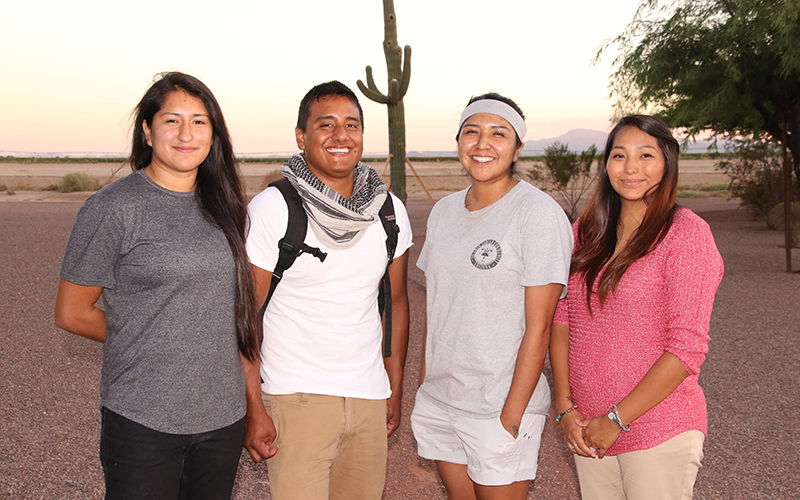
Cecily Peters, Richard Lopez, Amber Antone and Savanna Gonzalez stand together before leaving to join the protest against the Dakota Access Pipeline on Sept. 9. (Photo courtesy of Kristina Morago/Ak-Chin O’odham Runner)
MARICOPA – Cecily Peters and three other members of the Ak-Chin Indian Community loaded into an SUV Friday evening and drove 24 hours straight to join the protest of the Dakota Access Pipeline in North Dakota.
The week leading up to the trip, the quartet of 20-somethings requested time off work, hired babysitters and funded the journey themselves. Then they loaded food and supplies for the other protesters and headed north.
The Arizona residents joined the Standing Rock Sioux Tribe’s fight against a massive pipeline project that would traverse sacred land and potentially threaten their water supply. The Ak-Chin tribal members said the drive to help others fight for water is natural to them because it is embedded in their history.
Peters, 22, is the granddaughter of an activist who fought for more than 20 years to settle water rights on the Ak-Chin Indian Community.
Delia M. Carlyle, vice chairwoman of the Ak-Chin tribal council, said friends and tribal members used to refer to Peters’ grandmother, Leona Kakar, as “Miss Water Rights” for her activism during the ‘70s and ‘80s when the small agricultural community south of Phoenix sued the federal government for water rights – and eventually won.
“We know as a community how important it is to fight for your resources, just like we did with the water settlement,” Carlyle said.
Peters said she felt compelled to go help the Standing Rock Sioux Tribe and ensure they and other tribes fighting for resources have “water like us.”
“As the granddaughter of Leona Kakar, I will continue to protect and fight for what’s right for our future generations,” Peters wrote in a Facebook message Wednesday during the trip back to Arizona.
Richard Lopez, 29, also joined the trip and said he felt a sense of camaraderie with the Standing Rock Sioux Tribe.
“(Ak-Chin) is a small community, and they all got together and decided, ‘We are not going to take this anymore,'” Lopez said.
He added that he hoped their presence at the protests in North Dakota sent a message to the Standing Rock Sioux Tribe that “it’s not just them anymore, it is all of us.”
Savanna Gonzalez, a 26-year-old detention officer, said after watching coverage of the protests in the media, she decided she needed to be there, too.
“I have five little ones at home,” Gonzalez said. “This is their fight, too, when they get older.”
Amber Antone, 24, said she had to think twice when Gonzalez approached her about joining the trip. However, during a video interview Wednesday morning on their car ride back to Arizona, she said the experience was “really worth” the sacrifice.
Gonzalez said she originally wanted to cook and provide assistance to elders at the protest. However, she said many of the older population generally stayed in hotels and ate away from campgrounds.
Instead, she said the group volunteered in the kitchen, helping to feed thousands of other activists.
“Everything moves fast when we all work together, of course,” she said.
Protesters have been camped out for weeks near the Standing Rock reservation. Federal agencies temporarily halted construction on the pipeline Friday, according to a statement by the Department of Justice. However, protests continue.
Lopez said there were more people at the protest than he’d expected. In fact, he said the group stayed in one of three overflow camps.
He attributed the calm atmosphere of the camp to the temporary halt in construction.
“We never had to meet with pipeline workers. (Protesters) could focus on prayers and staying positive,” Lopez said Wednesday morning.
Every member who made the trip said they plan on returning to the protests when they can gather more donations and raise enough funds to make the trip again.